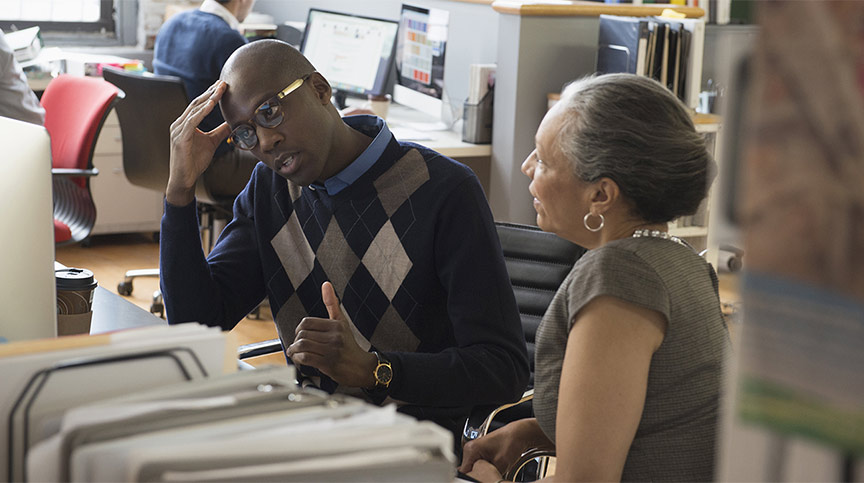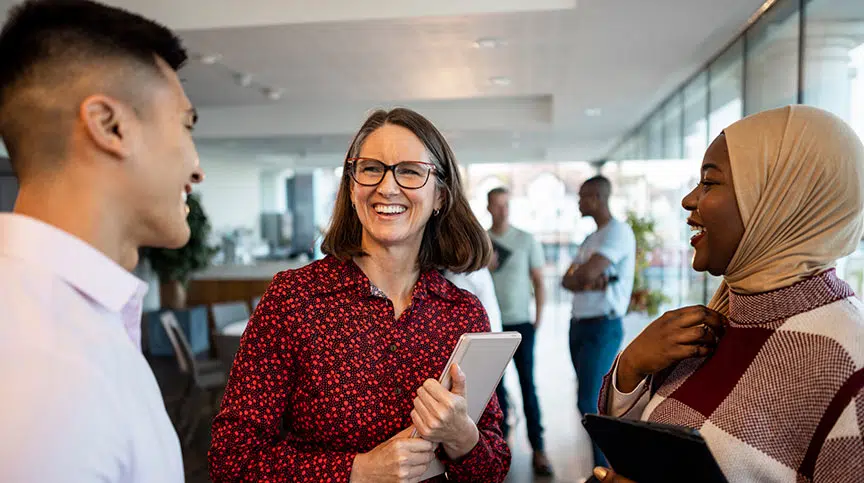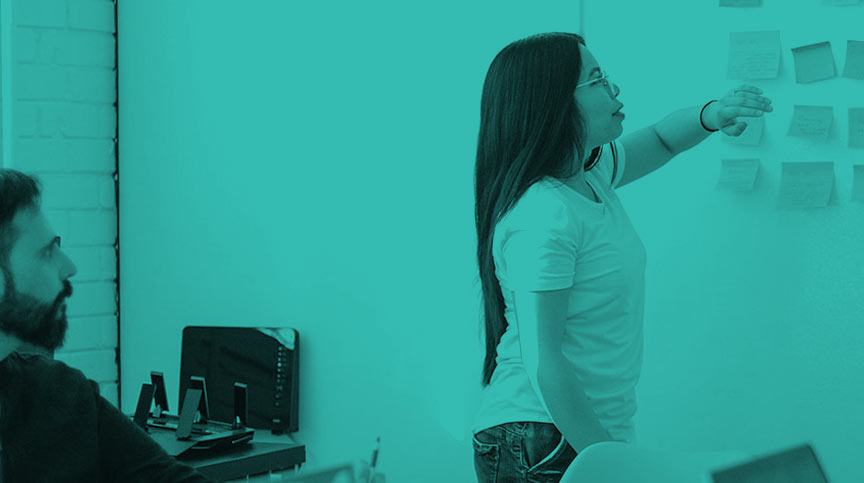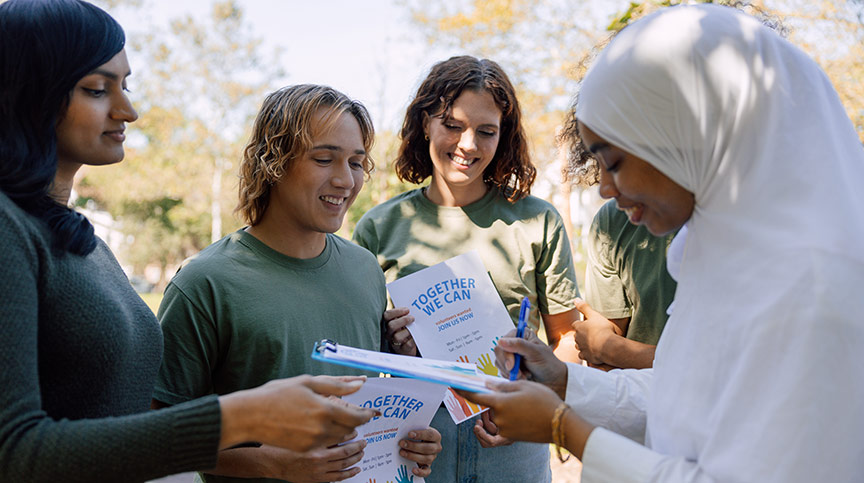Challenging conversations are more than just a fact of life — they’re an opportunity to create greater understanding among individuals in your organization.
We help leaders effectively navigate these conversations, turning potential conflict into constructive collaboration. To provide insight to our approach, we’ve asked Marin Burton, a senior faculty member in our Societal Impact group, for her perspective on how to approach challenging conversations in your organization.
What Exactly Are Challenging Conversations?
Challenging conversations are a dialogue where the people involved hold differing views on an issue, often with deep-rooted passion and commitment. The emotional charge that goes with these conversations can make them tricky to navigate, but they’re an integral part of our growth and understanding.
These conversations can crop up anywhere — within our teams at work, in our interactions with community members, or even around the dinner table with family. Recently, we’ve observed an uptick in challenging conversations surrounding post-pandemic work arrangements.
For example, we’ve seen challenging conversations emerge post-pandemic as employees and organizations struggle to find common ground on workplace location and flexibility. You probably know someone who feels strongly about having a flexible schedule or remote work. At the same time, you likely know a supervisor who feels strongly about having their entire team in the office at the same time. At first glance, it appears that these 2 parties are on opposite sides of the issue.
When we take a step back, we can recognize that neither party is wrong. It’s both good to have a flexible work schedule and also valuable to have an entire team in the office when they are collaborating. Even though both people have valid points and perspectives, it can feel like an either / or choice; therefore, setting up a challenging conversation. Neither perspective is wrong; both flexibility and collaboration hold value. However, the seeming opposition can create a challenging conversation.
In our wider communities, we see many instances where people stand on polar opposite sides of issues, from tax policies to educational reforms. Our brains naturally seek patterns, and in doing so, we may inadvertently reinforce our own views, missing potential common ground.
The key is to disrupt this either / or narrative. While these challenging conversations may seem daunting, they provide us with an opportunity to explore, understand, and ultimately bridge the gap between differing perspectives. Remember, it’s not about winning an argument, but about fostering understanding and potentially finding a common path forward.
What Sparked the Idea for This New Approach to Challenging Conversations?
I’ve always had an interest in creating meaningful dialogue and the study of polarity thinking, but my journey toward this design was largely influenced by my experiences with our clients. A particularly impactful instance was my work with a superintendent of schools and her cabinet. We had collaborated for several years when the pandemic struck, triggering a wave of divisive accusations from parents and community members during school board meetings. The situation escalated to the point of media coverage, and the leaders were grappling with how to respond.
During our scheduled 2-day leadership development retreat amid these challenges, it became clear that we needed a different approach. We needed a shift in both mindset and skillset that could facilitate a higher quality of conversation, turning conflict into collaboration.
As I delved into the design of this new approach, I found a myriad of applications. As humans, we are social beings who once depended on our groups to keep us safe. Once, our very survival depended on them; today, this hardwiring can trigger an “us versus them” mentality when faced with an interpersonal conflict. This can push us away from seeking common ground to engaging with each other in a more defensive stance.
In response, our design aims to break this cycle. I’ve facilitated this design with various nonprofit groups, public health officials, and education leaders, and the feedback has been overwhelmingly positive. It offers a fresh perspective, a new way to navigate through challenging conversations, and ultimately, a path toward greater understanding.
What Makes Your Approach Unique?
At CCL, we’ve established frameworks for increasing understanding and providing feedback, forming the foundation of our design. However, to truly bridge the gap in challenging conversations, we needed to go beyond understanding and foster empathy for differing perspectives.
Challenging conversations often arise from differing values or worldviews, which can create tension. This is where our approach shines, incorporating one of my favorite tools — polarity thinking. This framework, offered to us from Polarity Partnerships, has profoundly changed my own worldview. It acknowledges the paradoxical nature of our complex world. It challenges us to hold 2 truths simultaneously, recognizing that the person across the table has a valid perspective, even if it differs from our own.
Our Leading Challenging Conversations approach invites people to understand and empathize with the polarity at the heart of the conversation. Through a process called polarity mapping, we learn to appreciate not only the merits of our own perspective but also the value of the opposing viewpoint.
This approach encourages us to see the humanity in others and respect their perspective, even when we fundamentally disagree. The conversation shifts from an either / or to a both / and scenario. We may disagree, but we both bring value to the conversation. The question then becomes, how can we learn from each other and leverage our differences rather than allowing them to divide us?
How Can Challenging Conversations Spark Hope?
Challenging conversations, while tough, hold a silver lining. They offer us the opportunity to embrace our human capacity to hold 2 truths simultaneously and validate multiple perspectives. This doesn’t mean we always have to agree, but we can strive to understand the roots of differing viewpoints.
In my travels across the country, working with diverse leaders and organizations, I’ve encountered individuals doing their best with the resources they have. Most people genuinely intend to make a positive impact on others, the world, or their organizational mission.
Engaging in challenging conversations can strengthen relationships. They don’t always turn out perfectly. But if done well, we can always learn something. Our world is growing more complex, and our brains often prefer familiar paths. It takes effort to retrain our deep-seated impulses to be right or defend ourselves.
Instead of retreating to our corners in a battle to be right, what if we embarked on a quest to be curious? This approach encourages us to operate from the best version of our humanity, enabling us to see the best in others and bring about the changes we desire in the world.
Ready to Take the Next Step?
Enabling your team to hold challenging conversations more effectively could help to strengthen your organization. If you, like us, believe in the power of leadership to drive social change, contact us to start a conversation about how we can partner together.










